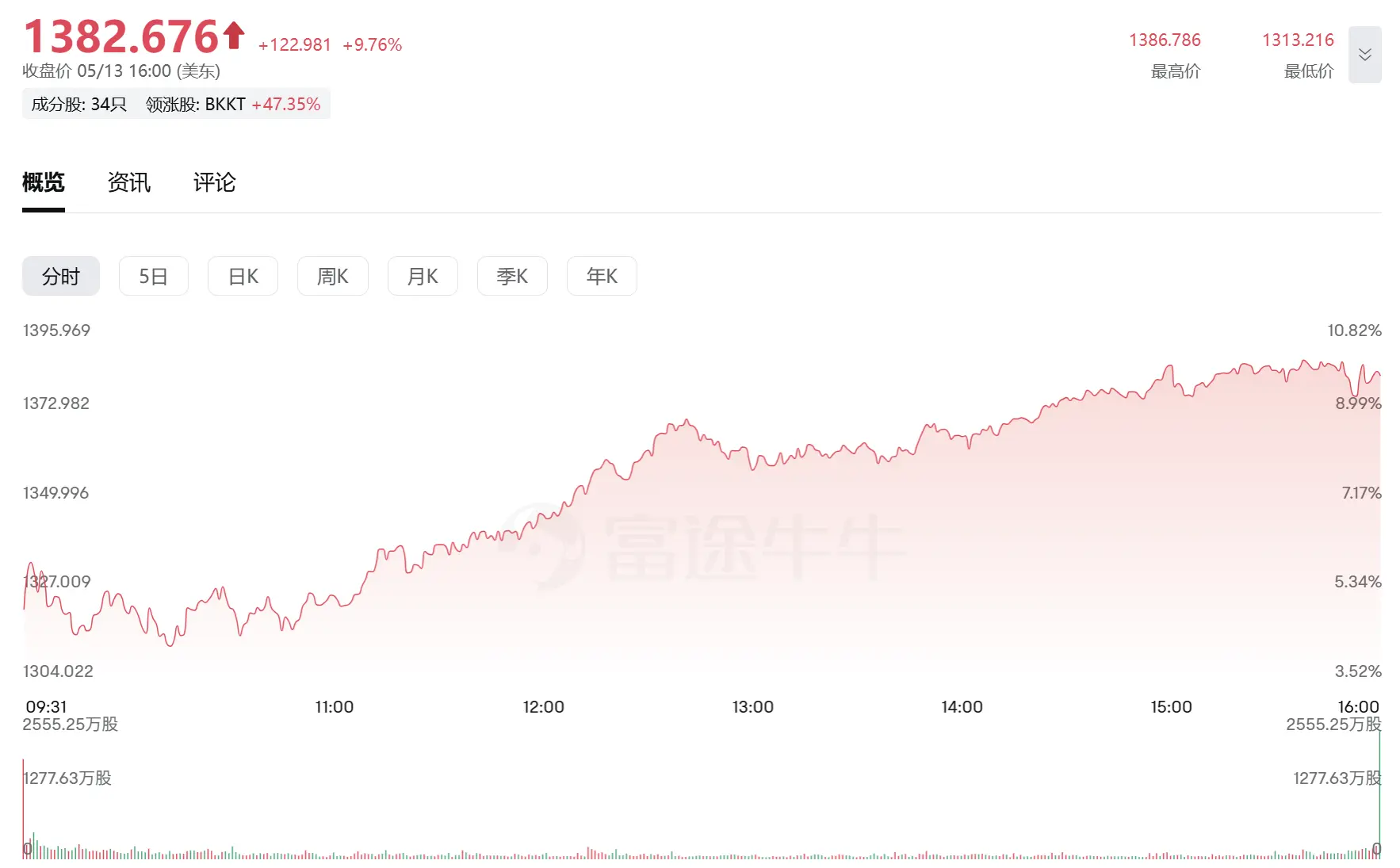Bakkt leads the rally, and crypto stocks start a "second venture"?
Authors: Scof, ChainCatcher
Editors: TB, ChainCatcher
There was no warm-up, no major upside, but the crypto concept stock Bakkt soared by more than 50% overnight.
Not long ago, Bakkt was marginalised by the market due to customer churn and declining revenue, but now it has suddenly rushed to the hot search and has become the brightest presence in crypto stocks. Behind the seemingly accidental surge, what rhythm has been stepped on? Is it a short-term speculative game, or is it a signal that the industry trend is quietly turning?
Bakkt skyrocketing, is it an opportunity or an emotion?
On May 13, Bakkt's stock price skyrocketed by more than 50% in a short period of time. The company, which was once seen as a "bridge for traditional finance to enter the crypto world", has suffered from customer churn and shrinking revenue in the past few years, and this sudden reversal has attracted market attention. The apparent reason was that it achieved a net profit of $7.7 million in the first quarter, the first profit in recent years. However, a closer look at the earnings report shows that this is mainly due to cost cuts and one-time adjustments, and the core business has not improved significantly.
What really ignited the mood was the new strategy released by the company. Bakkt announced a partnership with DTR, founded by former SoftBank executives, to launch an AI plug-in and stablecoin payment service to tap into the popular "PayFi" track, a global payment infrastructure that combines AI agents and on-chain settlement. This "new narrative" of superimposed AI and encryption quickly sparked market speculation.
In addition, Bakkt's "M&A concept" has been reactivated. Negotiations with Trump's TMTG have been unsuccessful, but ICE still holds more than half of its shares, and there are rumours that Apex Fintech may take over. Driven by a very small float and a whopping 23% short position, the short squeeze was quickly staged and the stock price was quickly pulled up.
From a fundamental point of view, the platform is still under tremendous pressure. On the one hand, Bakkt's major customer, NASDAQ-listed brokerage Webull, will terminate its cooperation with it in June. Bakkt used to provide cryptocurrency trading and custody services to Webull, which used to account for more than 70% of Bakkt's total revenue. On the other hand, Bank of America will also end its partnership with Bakgt, which will affect Bakkt's loyalty services segment, which focuses on points redemption, digital rewards and other solutions for corporate customers.
With the loss of two major customers, Bakkt's revenue structure has become more fragile. This round of surge is more like a concentrated release of short-term market sentiment rather than a substantial turning point in fundamentals.
Crypto stocks are collectively restless, what is the market betting on?
Bakkt's anomaly is not an isolated phenomenon. During the same time period, the crypto concept stock sector generally strengthened, and many individual stocks rose significantly. Coinbase rose 23.97%, TeraWulf rose 10.06%, Amber Group and DMG Blockchain gained nearly 10%, and MicroStrategy also recovered more than 4%. Overall, the crypto stock sector rose nearly 10% for the week, showing the intensive deployment of funds in this track.
More important, however, is that the market is starting to re-examine the value of crypto "infrastructure". In the past few cycles of the crypto market, most of the money went to exchanges, platform coins or mining companies, but now investors are gradually turning their attention to those "pipeline" companies - companies that provide custody, settlement, clearing, compliance, risk control and other services. They are more like the hydropower and coal of this ecosystem, with a stable income model, and it is easier to adapt to the valuation system of traditional finance. Bakkt's skyrocketing has hit this structural preference, and it's not the only one.
Traditional finance is in full swing
The real turning point of the crypto industry is not the short-term rise in the stock price of a certain platform, but the fact that more and more traditional financial institutions are choosing to join the game.
Online brokerages in Hong Kong have taken the lead. Futu Securities launched a cryptocurrency trading service, allowing users to directly deposit and trade mainstream currencies such as Bitcoin, Ethereum, and USDT through their Hong Kong and U.S. stock accounts. Tiger Brokers has launched the deposit, trading and withdrawal functions of crypto assets, and connected them with traditional stock trading. Victory Securities is also licensed to support crypto-asset-related businesses, leading the market. Standard Chartered's Hong Kong subsidiary announced that it will participate in the Hong Kong Monetary Authority's stablecoin sandpit with its partners, trying to explore on-chain payment solutions under the compliance framework.
At the same time, the global payment giants are moving more aggressively. Stripe launches stablecoin accounts and programmable stablecoin USDB in 101 countries; Visa and Mastercard have expanded their integration with partners such as Circle to connect stablecoins such as USDC to their payment networks, allowing users to spend on-chain assets through traditional cards. PayPal uses a yield of 3.7% to attract users to hold PYUSD, trying to build a closed loop of settlement based on stablecoins. Even established cross-border remittance companies like MoneyGram connect traditional cash and on-chain assets through stablecoins called Ramps, covering more than 170 countries.
The common point of these trends is that traditional finance no longer regards crypto as a flood beast, but has begun to actively "on-chain" itself. This is both a response to changes in user needs and a pursuit of cost efficiency. Stablecoins and blockchain technology provide a faster, cheaper, and more transparent infrastructure than traditional networks with high fees and slow settlements. And whoever can take the first place in this new system is more likely to have a say on the future financial map.
Bakkt's new strategy is the result of this trend. Although it is not as large and technical as Stripe and Visa, as an institution that holds a national license and has custody and liquidation capabilities, it may still become a target for mergers and acquisitions or an entry point for cooperation. That's exactly why the market is revaluing it – not by how much money it makes today, but by whether it has the potential to be the next ticket.
epilogue
The Bakkt surge is a microcosm of this wave, but it's not the whole story. We are witnessing the beginning of an era shift as capital markets begin to re-examine the value of crypto infrastructure, more and more traditional financial institutions no longer shy away from crypto technology, and "on-chain finance" becomes an executable strategy rather than a distant fantasy.
In this round, it is not by shouting slogans to make money, but by those who really build bridges, pave roads, and connect to mainstream systems to leave value.


